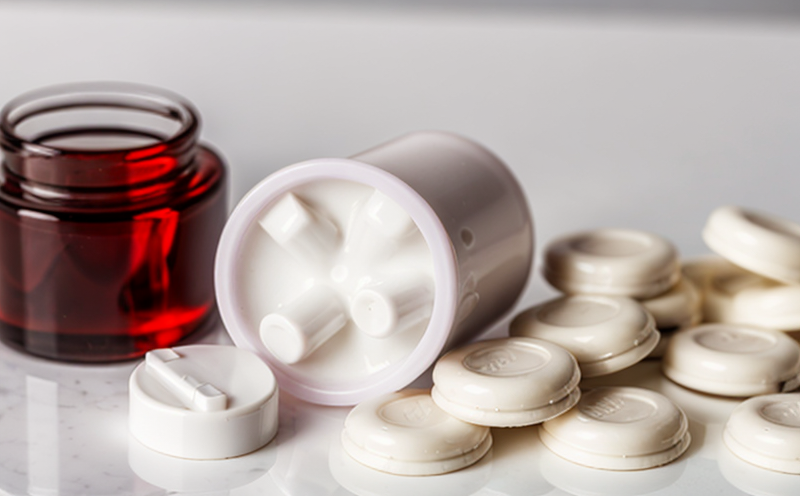USP Tablet Container Closure Integrity Testing
The pharmaceutical industry's quality and safety standards are paramount. Ensuring that oral solid dosage forms, such as tablets, meet these high benchmarks is critical for the integrity of the entire product lifecycle. One essential aspect of this process is USP Tablet Container Closure Integrity Testing (USP 1207). This testing ensures that containers used to package pharmaceutical products maintain their integrity and protect against contamination.
USP 1207 outlines specific methods for evaluating the integrity of container-closure systems, which encompass not only the container itself but also any seals or closures. The primary goal is to verify that these systems can prevent the ingress of particulates, moisture, oxygen, and other contaminants that might compromise the stability and efficacy of a drug product.
The testing process involves placing tablets in containers under controlled conditions designed to simulate real-world storage environments. After exposure to these conditions, the integrity is assessed by detecting any leaks or breaches that could allow harmful substances into the container. This evaluation typically includes pressure differential tests, visual inspections, and sometimes more advanced techniques like helium leak detection.
For quality managers and compliance officers, this testing ensures adherence to regulatory requirements set forth in the United States Pharmacopeia (USP). By performing USP 1207 testing, manufacturers can demonstrate that their container-closure systems meet stringent standards for protecting drug products. This is particularly critical for oral solid dosage forms like tablets, which are widely used and must remain stable throughout their shelf life.
From an R&D engineer's perspective, USP 1207 testing provides valuable insights into the performance of container-closure systems under various environmental stressors. Engineers can use this information to optimize design parameters and select materials that offer superior protection against contamination. For procurement professionals, ensuring compliance with these tests helps in selecting reliable suppliers who meet stringent quality benchmarks.
Compliance officers must be aware of the implications non-compliance could have on product safety and regulatory scrutiny. By adhering to USP 1207 testing protocols, companies can avoid potential recalls and lawsuits while maintaining a strong market reputation for their products.
The methodology outlined in USP 1207 is not only comprehensive but also flexible enough to accommodate different types of container-closure systems. This adaptability makes it an essential tool for pharmaceutical manufacturers aiming to ensure the integrity of their packaging and protect the quality and safety of their oral solid dosage forms.
The importance of this testing cannot be overstated, as even minor breaches can lead to significant issues in drug stability and effectiveness. By employing USP 1207 tests, companies can safeguard against these risks, ensuring that their products meet the highest standards set by regulatory bodies.
Applied Standards
The USP Tablet Container Closure Integrity Testing is governed primarily by USP Chapter 1207 - Container-Closure Systems for Parenteral and Oral Solid Dosage Forms. This chapter provides detailed guidelines on how to evaluate the integrity of container-closure systems used in pharmaceutical packaging.
- Pressure Differential Testing: This method involves subjecting containers to a pressure differential to assess their ability to withstand external pressures without compromising the seal. It is particularly useful for evaluating the effectiveness of seals against moisture ingress.
- Visual Inspection: A simple yet effective way to check for obvious breaches in the container-closure system. This method involves inspecting containers under controlled lighting conditions for any visible signs of damage or leakage.
The testing process also incorporates advanced techniques such as helium leak detection, which offers a more precise measurement of leaks than traditional methods. This approach is especially valuable when dealing with complex container-closure systems where minute breaches could compromise product integrity.
Benefits
- Ensures Product Integrity: By confirming that container-closures maintain their integrity, companies can prevent the entry of contaminants such as moisture and oxygen, which could degrade the drug product.
- Avoids Regulatory Non-Compliance: Compliance with USP 1207 standards ensures that packaging meets regulatory requirements, thereby avoiding potential legal issues and fines.
- Enhances Consumer Confidence: A robust container-closure system instills confidence in consumers regarding the safety and quality of their medication.
- Promotes Product Stability: Properly sealed containers help maintain drug stability, extending shelf life and ensuring consistent efficacy over time.
International Acceptance and Recognition
The USP Tablet Container Closure Integrity Testing is widely recognized not only in the United States but also internationally. Regulatory bodies around the globe, including those in Europe (EMA) and Asia-Pacific regions, have incorporated similar standards into their guidelines to ensure product safety and efficacy.
- European Medicines Agency (EMA): EMA aligns its container-closure integrity testing with USP standards, emphasizing the importance of preventing contamination during storage.
- Australian Therapeutic Goods Administration (TGA): The TGA recognizes USP 1207 as a benchmark for ensuring that containers are suitable for protecting oral solid dosage forms.
The international acceptance of these tests underscores their significance in the global pharmaceutical industry. By adhering to these standards, manufacturers can ensure that their products meet the highest quality and safety benchmarks recognized worldwide.





